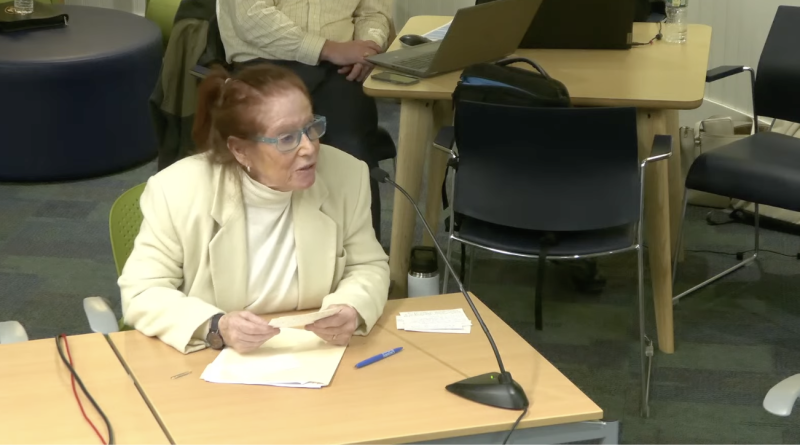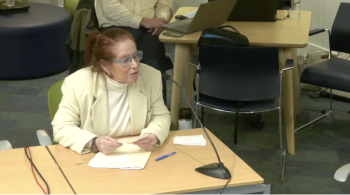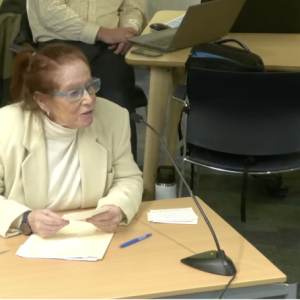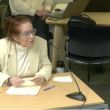Rockport Select Board reviews proposed land use ordinance amendments, citizens question rental rules
ROCKPORT — With the presentation to the Select Board of proposed changes to Rockport’s land use ordinance – made primarily with the intent to conform to state law governing housing development, but with additional amendments focused on short term rentals and elimination of performance standards for mountainside developments – the review process before the broader public has begun.
And it was not without criticism.
“What is changed that we need an ordinance that we did not have before,” asked longtime Rockport resident Vic Steinglass, in reference to the rental rules proposed in the amendments. “More bureaucracy, more keeping track. We don’t need that. We got along just fine without it for 100 years. How is this ordinance, relating to Rockport rentals, going to make the average Rockport citizen’s life any better? Not at all... I don’t want to be tracked by my computer. I don’t want to be tracked by Orion.”
The Select Board received the packet of information from Rockport Planning and Community Development Director Orion Thomas, and agreed to more formally consider the amendments at is regularly scheduled March meeting.
Board Chair Denise Munger asked the board members if any “red flags” presented. If so, remarks and concerns would be routed back to the Planning Board for consideration.
No board members spoke up, and Munger explained that the proposed ordinance amendments would appear on the June Town Meeting ballot as seven separate items. Public hearings on the proposed amendments would take place in April, she said.
The amendments (click here for the complete document of proposed changes) include the addition of Planned Unit Developments to the land use ordinance.
PUDs, said Thomas, in explanatory memo appearing with the changes: “is aimed at creating another tool the Town can use to increase the housing stock. Currently, Rockport’s Land Use Ordinance is a black and white setup with little flexibility for a developer to create housing that is sorely needed. If Rockport is to increase housing supply, then additional tools such as this PUD are needed. This PUD ordinance will allow for density bonuses in exchange for types of housing and other amenities for the community at large.”
Town Manager Jon Duke said in a memo to the board that Rockport needs to incorporate the state’s requirement for municipalities to allow for more housing, as stipulated in the 2022 LD 2003 An Act To Implement the Recommendations of the Commission To Increase Housing Opportunities in Maine by Studying Zoning and Land Use Restrictions. (While that act is commonly referenced across the state as LD 2003, each Legislative session assigns the same number to new bills. That means that currently in the 131st Legislature LD 2003 is "An Act to Protect Access to Maine's Intertidal Zone").
Duke said this about the 2022 housing act: “The reason we are incorporating this legislation is if we do not, and if a developer or landowner wants to utilize this legislation to create housing by ways of a subdivision or a simple Additional Dwelling Unit placed in the landowners back yard, our existing Land Use Ordinance would not otherwise allow it. This legislation overrules our home rule authority and would thereby go through a lengthy and expensive court proceeding with a result of LD 2003 standing and having authority over our local land use ordinance.”
Proposed changes, which include reducing the minimum lot size for dwelling units by half or even more in various districts, and reducing setbacks in some will affect:
Planned Unit Development ordinance
Affordable Housing ordinance
Cluster Development ordinance
Section 900
Section 918 Dimensional Table
Rental Housing Unit Ordinance
Accessory Dwelling Unit ordinance
Review Proposed Land Use Ordinance amendments for recommendation to Select Board
Short Term Rentals
The proposed new rules governing short term rentals is included under the Accessory Dwelling Units ordinance language.
The Planning Board wrote in its introduction:
“While the Town is not opposed to rental units of any type, the Town is cognizant of the issue short term rentals pose for small communities such as Rockport by turning small communities into sleeping towns in the summer months and vacant in the winter. STRs can also affect the year-round housing market in that families wanting to move to Rockport are often outbid by entities interested in purchasing property for rental purposes for only a portion of the year.
“With this being said, types of STRs are beneficial to a community. An example would be an STR on an owner-occupied lot to help with some of unexpected expenses to allow a person/family to remain in their house and in the community, or for a landowner to provide a portion of their house for rent for workers in our local workforce. For enforcement purposes, the language below is proposed to help mitigate issues beforehand and to ensure all rental units have a Certificate of Occupancy.”
The proposed rules stipulate that an inspection of any rental unit will be required.
Additionally, all landlords will be required to register their rentals with the town, obtain a certificate of occupancy, pay an annual fee to the town, renew registration annually, post an Emergency Information Sheet with a registration number, issued by Code Enforcement Officer, as well as the physical address of the Rental Housing Unit and instructions on how to contact emergency responders; information on how to file a complaint regarding life safety requirements with the Town of Rockport; and the name, mailing address, email address, and telephone number of the owner or contact person for the property.
Advertisements for all Rental Housing Units must include the issued registration number on all forms of advertisement, including but not limited to online platforms.
Also, no one is to be housed separately or apart from the dwelling unit in any tent, trailer, camper, lean-to, recreational vehicle, accessory structure or other structure of a similar nature.
Trash and recycling are to be removed on at least a weekly basis for all Rental Housing Units.
If there are violations of the rules, the landlord cannot rent for three months.
Both Rockport resident Claire Tully and Vic Steinglass reminded the Select Board that the town had voted in 2021 against short term rental ordinance language. In June 2021, 194 ballots were cast in favor of a short term rental ordinance, 407 were opposed to it.
If approved and enacted the failed ordinance would have limited the number of short-term rentals allowable in particular zoning districts throughout Rockport, required each homeowner wishing to rent out their property to register with the town Code Enforcement Officer each year and be willing to have their property inspected by the Code Enforcement Officer and the Fire Chief.
“Just two years ago we dealt with this,” said Tully. “Extensive workshops took place.”
She said it seemed disingenuous that the short-term rental language was again appearing before voters, “to talk about need for registration.”
She said, citing the annual fee, penalties, daily fines and threat of major violations: “It’s not anything you’d apply to a business.... It’s really overreaching in the absence of problems. Clearly there are a few members of the planning board who feel very strongly about this.”
Tully reminded the Select Board of the 70 percent margin that the 2021 vote had.
“A lot was from residents who don’t like excess regulations in the absence of a problem,” she said.
Marsha Steinglass pointed out that Years 2022 and 2023 produced no police complaints in relation to short-term rentals.
She also said that Knox County has an estimated 5.2 percent of its housing in short-term rentals, and Rockport has an estimated 5 percent of its housing in short-term rentals.
“You are doing all of this and making hardships for our residents for 5 percent of dwelling units,” said Marsha Steinglass.
Reach Editorial Director Lynda Clancy at lyndaclancy@penbaypilot.com; 207-706-6657

























